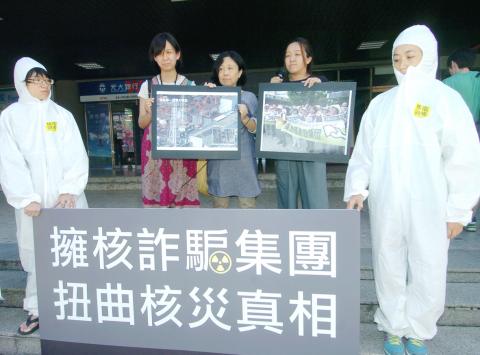The Green Citizen Action Alliance (GCAA) yesterday protested outside a forum held by Taiwan Power Co (Taipower) and Chung-hwa Nuclear Society, criticizing the organizers for inviting speakers who they said had a pro-nuclear power stance.
“Distorting the real facts about nuclear power,” several GCAA members chanted together, while holding a banner that implied that the organizers and speakers at the forum were all part of a “pro-nuclear power fraudulent organization.”
The group said the Japanese speakers had been advocates for nuclear power in their country for many years, even after the Fukushima Di-ichi nuclear power plant disaster in 2011, so by inviting them to talk about nuclear power, Taipower seems to be trying to misguide the media and the public.

Photo: Wang Min-wei, Taipei Times
One of the speakers, Michio Ishikawa, a supreme adviser at the Japan Nuclear Technology Institute, said the main cause of the Fukushima Di-ichi disaster was not the devastating earthquake, but rather the following tsunami that led to a 10-day blackout at the plant, causing a nuclear meltdown and radiation leak.
There is no problem with the safety designs at present, but the risk of blackouts cannot be avoided with the current level of technology, he said, adding that the disaster was man-made and resulted from the failings of the government and related agencies.
However, the GCAA said Ishikawa has long been an advocate of nuclear power, and that the official report made by the Fukushima Nuclear Accident Independent Investigation Commission of Japan’s Diet had stated “we believe there is a possibility that the earthquake damaged equipment necessary for ensuring safety.”
They also questioned the background of another speaker, Masao Nakamura, an honorary adviser at the Central Research Institute of Electric Power Industry and a former journalist who wrote about nuclear power issues for many years for Japan’s Yomiuri Shimbun daily, by saying that he had been commissioned by the Japan Atomic Energy Relations Organization to write a propaganda strategy report back in 1991.
The group said another speaker — Noboru Takamura, a professor at the Nagasaki University’s Department of Radiation Epidemiology — has spoken about how being exposed to certain levels of radiation may not necessary lead to negative health impacts, but they questioned why recent news reports have shown several children living near the Fukushima Dai-ichi nuclear power plant having been diagnosed with thyroid carcinoma.
Minister of Economic Affairs Chang Chia-juch (張家祝) told the forum: “We will allow the public to make the final decision [about the Fourth Nuclear Power Plant in New Taipei City’s Gongliao District (貢寮)], but no matter what, we will definitely complete its construction safely.”
He said many reports have exaggerated the impact of the Fukushima Dai-ichi disaster, such as the number of deaths or the cost of compensation and restoration, but until today the Japanese government’s official report showed that only seven people died at the plant and none of the deaths were directly attributable to radiation exposure.
“There is no so-called ‘safe’ nuclear power,” GCAA secretary-general Tsuei Su-hsin (崔愫欣) said. “The most serious problem about using nuclear power is that if a serious accident happens, the scale of the disaster would be so large that everyone in Taiwan would have to bear the consequences, and the risks posed would last for generations.”

Alain Robert, known as the "French Spider-Man," praised Alex Honnold as exceptionally well-prepared after the US climber completed a free solo ascent of Taipei 101 yesterday. Robert said Honnold's ascent of the 508m-tall skyscraper in just more than one-and-a-half hours without using safety ropes or equipment was a remarkable achievement. "This is my life," he said in an interview conducted in French, adding that he liked the feeling of being "on the edge of danger." The 63-year-old Frenchman climbed Taipei 101 using ropes in December 2004, taking about four hours to reach the top. On a one-to-10 scale of difficulty, Robert said Taipei 101

Nipah virus infection is to be officially listed as a category 5 notifiable infectious disease in Taiwan in March, while clinical treatment guidelines are being formulated, the Centers for Disease Control (CDC) said yesterday. With Nipah infections being reported in other countries and considering its relatively high fatality rate, the centers on Jan. 16 announced that it would be listed as a notifiable infectious disease to bolster the nation’s systematic early warning system and increase public awareness, the CDC said. Bangladesh reported four fatal cases last year in separate districts, with three linked to raw date palm sap consumption, CDC Epidemic Intelligence

US climber Alex Honnold left Taiwan this morning a day after completing a free-solo ascent of Taipei 101, a feat that drew cheers from onlookers and gained widespread international attention. Honnold yesterday scaled the 101-story skyscraper without a rope or safety harness. The climb — the highest urban free-solo ascent ever attempted — took just more than 90 minutes and was streamed live on Netflix. It was covered by major international news outlets including CNN, the New York Times, the Guardian and the Wall Street Journal. As Honnold prepared to leave Taiwan today, he attracted a crowd when he and his wife, Sanni,

Taiwanese and US defense groups are collaborating to introduce deployable, semi-autonomous manufacturing systems for drones and components in a boost to the nation’s supply chain resilience. Taiwan’s G-Tech Optroelectronics Corp subsidiary GTOC and the US’ Aerkomm Inc on Friday announced an agreement with fellow US-based Firestorm Lab to adopt the latter’s xCell, a technology featuring 3D printers fitted in 6.1m container units. The systems enable aerial platforms and parts to be produced in high volumes from dispersed nodes capable of rapid redeployment, to minimize the risk of enemy strikes and to meet field requirements, they said. Firestorm chief technology officer Ian Muceus said